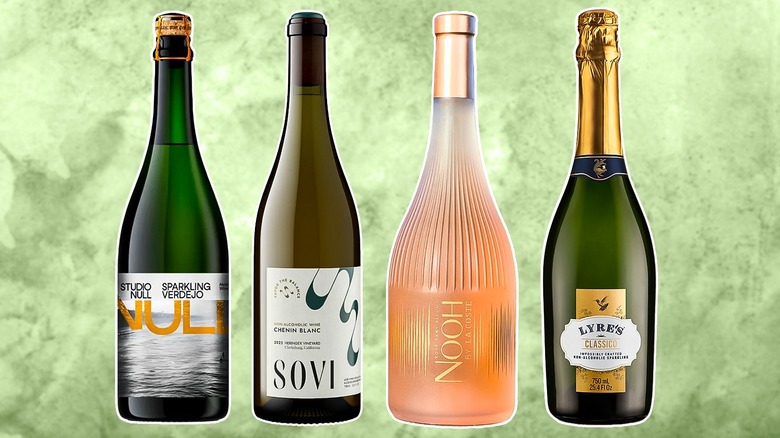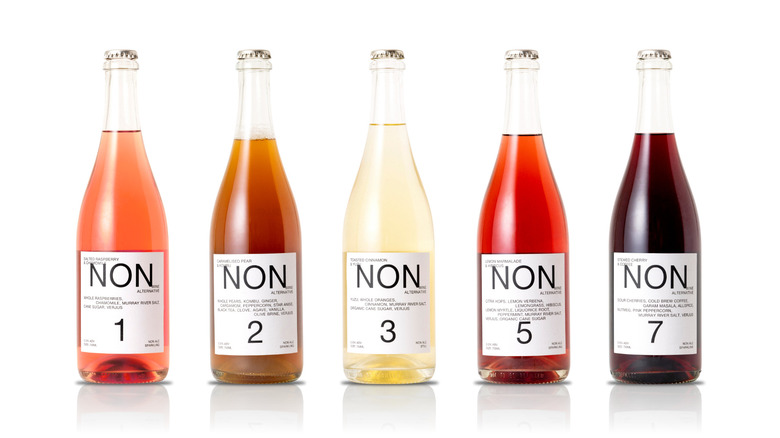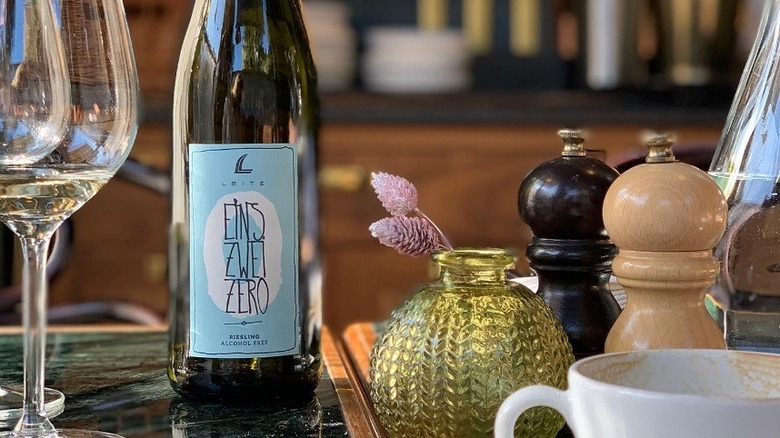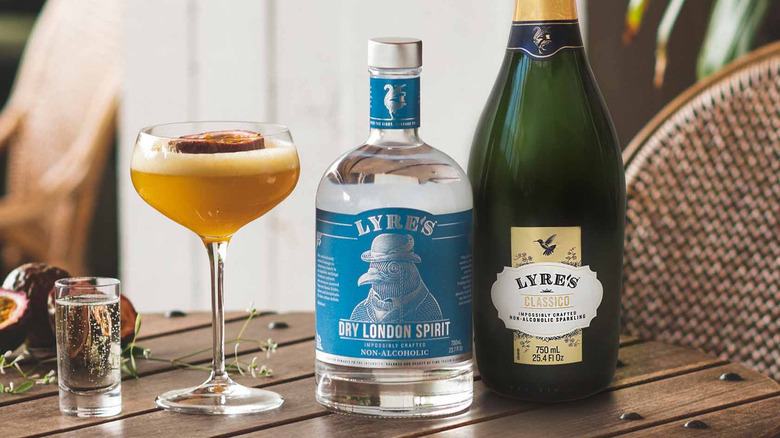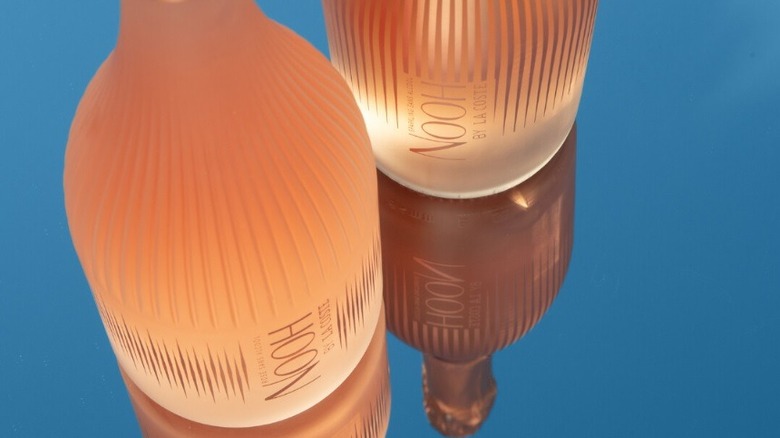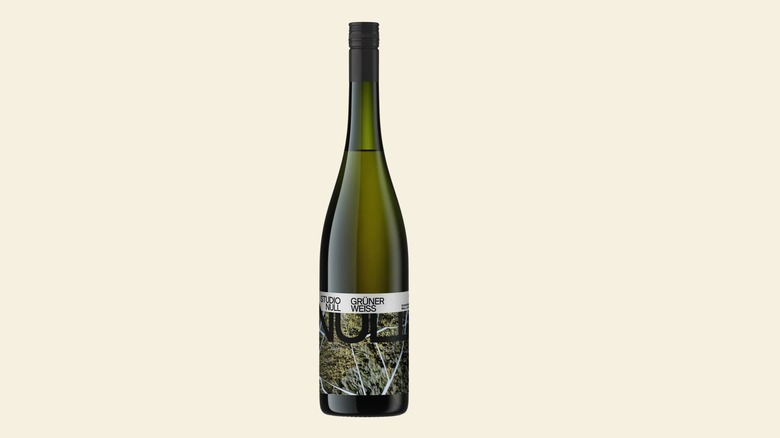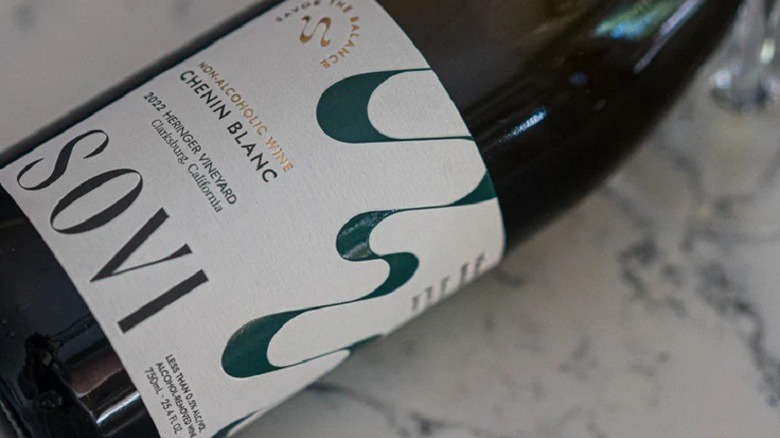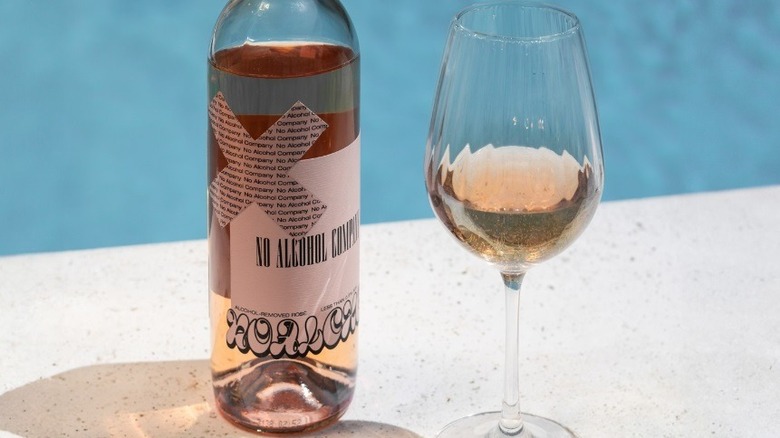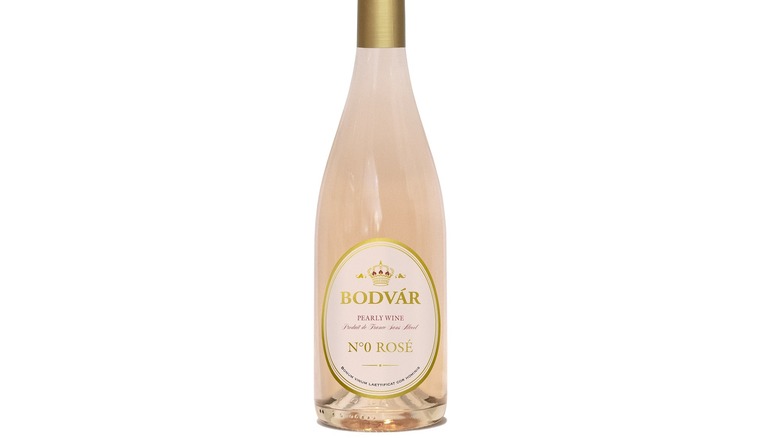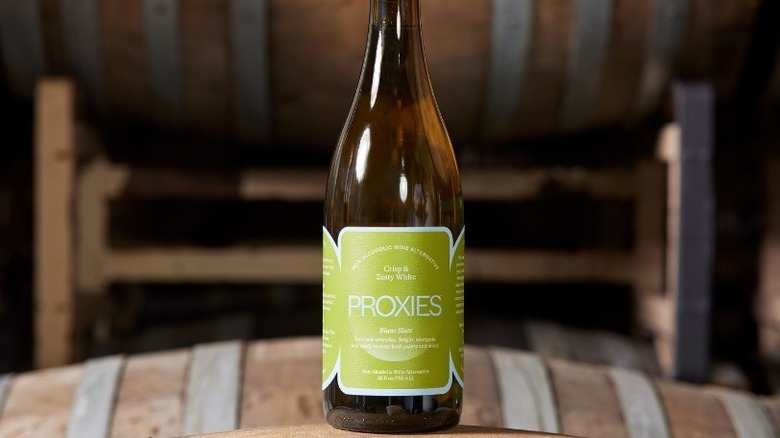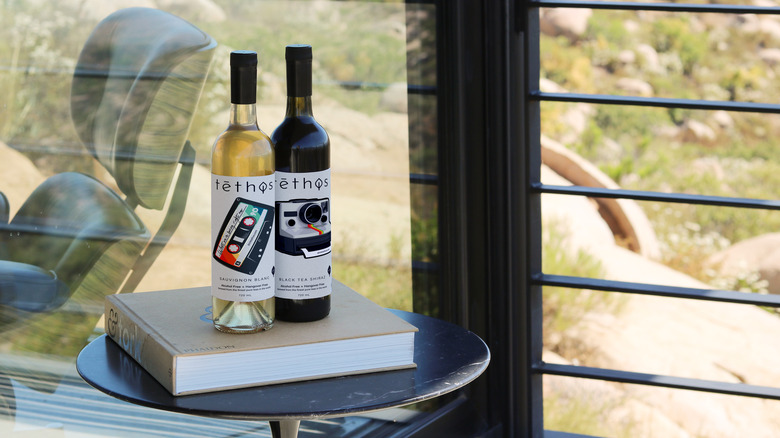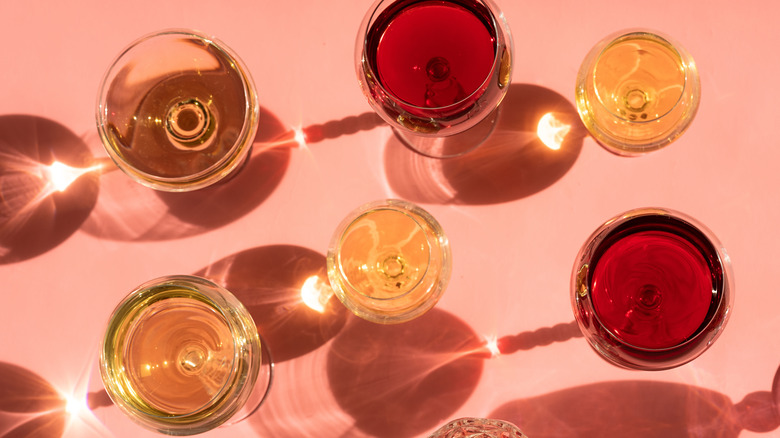10 Of The Best Non-Alcoholic Wines To Try
According to a poll by Gallup, younger adults are drinking less alcohol now compared to the last two decades. A lot of brands have seized the moment and quite a number of nonalcoholic drinks have now hit the market, from nonalcoholic spirits and cocktails to beers to wines.
Although nonalcoholic wines have become more popular in recent years, this beverage category has a long history dating back to the mid-1800s when a minister developed a nonalcoholic wine for communion. There's been a lot of progress in technology and innovation which has led to better tasting wine alternatives. Nowadays, there is plenty of variety — from wines that have had their alcohol removed using technologies, like vacuum distillation, to beverages that are technically not wine but made as alternatives using tea, fruit juices and other infusions.
Alcohol-free and nonalcoholic drinks are not necessarily the same — here in the U.S., nonalcoholic drinks can have up to 0.5% alcohol by volume, while alcohol-free has to have zero alcohol. Either one, though, will certainly keep you from getting drunk. I've tried a number of nonalcoholic wines, and I combined my experience with recommendations from several experts to curate this list of the best nonalcoholic wines and wine alternatives on the market. The list is a combination of both alcohol-removed wines and wine alternatives, and it includes both alcohol-free and nonalcoholic drinks.
NON
NON is a company out of Australia and its line of beverages is better suited to be called a wine alternative than an alcohol-free wine. Instead of removing alcohol from wine or creating something that mimics wine, NON is all about creating a drink that can replace the role of wine during meals –tThat is, NON is a beverage that is made to be paired and enjoyed with food. NON actually tastes nothing like wine, but each one is designed to pair with different types of foods. The founder, Aaron Trotman, and his partner Miranda love dining at Michelin-starred restaurants around the world and designed NON to be paired with fine dining tasting menus.
Each NON release has a completely different flavor profile, but the base that underlies them is verjus, an acidic juice that is made from Semillon grapes from Australia. The verjus is combined with ingredients that range from yuzu to coffee to kombu seaweed to achieve the flavor profile the producers want, keeping in mind the balance between acid and tannin and sugar. For me, rather than a nonalcoholic red wine that lacks body, the NON 7 made with stewed sour cherries, coffee, and spices is a better beverage choice. Others are more floral, like the sparkling NON 1, made with raspberries, chamomile, and a touch of salt.
Leitz Eins Zwei Zero Sparkling Riesling
This alcohol-free wine is a product of winemaker Johannes Leitz, who is considered one of Germany's best winemakers and was named Winemaker of the Year in 2011 by the French food and wine guide, Gault Millau. About 95% of the grapes that Leitz grows in his vineyards are Riesling grapes. Leitz actually started making Leitz Eins Zwei Zero, the alcohol-free version of his still and sparkling Riesling wines, in 2007 when a Norwegian chef asked for a nonalcoholic wine to pair with his food. The Eins Zwei Zero undergoes a vacuum distillation process to remove the alcohol from the wine.
Michelin-starred Kato Restaurant in Los Angeles offers a nonalcoholic pairing with its tasting menu. Kato's Director of Operations, Ryan Bailey, told Chowhound that the Leitz Eins Zwei Zero Sparkling Riesling is "a constant on our alcohol-free flight." Nonalcoholic wines tend to lack body (more on that later), but starting out with a sparkling nonalcoholic wine is good way to ease into the beverage category as the bubbles lead to a sensation of a fuller mouthfeel and you don't notice the lack of body as much as you would in a still wine. According to Bailey, "[Dealcoholized] wine can sometimes lack weight, depth, or structure, but this bottling gets all those from high acidity, minerality, citrus fruit profile, and carbonation."
Lyre's Classico
Lyre's launched in 2019 and has become one of the more well-known alcohol-free liquor brands out on the market. In addition to non-alcoholic spirits and ready-to-drink cocktails, this Australia-based company also makes a nonalcoholic sparkling wine called Lyre's Classico. This sparkling wine alternative is made by combining grape juice concentrates (both fermented and not fermented) with carbonated water.
Chris Chernock, the beverage director at Asterid and other restaurants at The Music Center in Los Angeles, recently put Lyre's Classico on his menu. Chernock told Chowhound that when deciding what nonalcoholic wine to offer on his menu, he "was looking for a quality nonalcoholic sparkling wine, and a lot of the samples I had just didn't have that effervescence that is usually expected in this category of wine." He found that "Lyre's packs a ton of small fresh bubbles that bounce on your palate with a nice apple and stone fruit backbone reminiscent of an Italian Prosecco."
Lyre's Classico is also available in cans, which makes it easier for those of us who want to enjoy it at home without opening a whole bottle. It can also be easily combined with its other spirit and liqueur offerings to make zero-proof cocktails.
NOOH
NOOH is a line of nonalcoholic wines produced by Château La Coste in Provence, France. Since Provence is known for rosé, NOOH naturally offers a still and a sparkling rosé. The two wines both start out using Château La Coste's Rosé d'une Nuit wine, and the alcohol is extracted using vacuum distillation.
For more insight, Chowhound reached out to Brianda Gonzalez, the founder and CEO of The New Bar, a nonalcoholic bottle shop with two locations in Los Angeles and one in San Francisco. According to Gonzalez, the still rosé from NOOH is currently at the top of her recommendation list because of its use of different grape varieties. "The blend of Grenache, Syrah, Cabernet, and Cinsault gives this rosé such satisfying depth of flavor," Gonzalez says.
The problem with alcohol-free wines tends to be the so-called body or mouthfeel of the wine, which is largely a result of the viscosity from the alcohol. When the alcohol is removed, this viscosity is also gone, and you end up with a light-bodied beverage. This is why I think it's easier to get a good nonalcoholic version of a crisp and light wine like rosé.
Studio Null Grüner Weiss
Studio Null sources wines from family-run vineyards in Europe and then brings them to Northern Europe, where the alcohol is removed using vacuum distillation. The process results in an average alcohol content of its wines of 0.3%. The company was founded by two friends, Dorothy Munholland and Catherine Diao, in 2021, but despite its relatively short history in the nonalcoholic market, its nonalcoholic wines have garnered impactful reviews from various publications.
Unlike many alcohol-removed brands who keep the same line of non-alcoholic wines on deck, Studio Null sources different wines each year as they tend work with small wine producers. Studio Null currently offers three wines in its latest lineup: a Prickly Red (a blend of Tempranillo and Syrah grapes sourced from Spain), a sparkling Verdejo (the grapes are also sourced from Spain), and a Grüner Weiss (with grapes sourced from Austria).
The Grüner Weiss is another nonalcoholic wine that Brianda Gonzalez from The New Bar recommends. For this Grüner Weiss, the grapes are sourced from a vineyard in Austria and had four hours of grape skin contact during fermentation. The wine, which is aged in stainless steel tanks, is a crisp white variety with high acidity and minerality. According to Gonzalez, this nonalcoholic wine is "bone dry" and "perfect for backyard gatherings and warm afternoons."
Sovi Chenin Blanc
Sovi is a husband-and-wife-owned company based in Northern California. The company was started by Julia Littauer, a certified sommelier, and her husband, Alex Littauer, who has a level 4 Diploma in Wines from WSET (one of the more well known wine education certifications). As their jobs require quite a bit of wine drinking, the Littauers were looking for better quality nonalcoholic wines they could enjoy on their days off. Sovi produces a line of alcohol-removed wines using grapes sourced from their partner vineyard in Clarksburg, California. As a sommelier, Littauer tends to take an extra step in making alcohol-removed wines, much like a winemaker would make a premium wine, like blending different vintages together or doing an extended cellar aging. For the Reserve Red, Sovi blends two different vintages of Tempranillo and Malbec, for instance.
The New Bar's Brianda Gonzalez recommends Sovi's 2022 Chenin Blanc, which is the company's second release, noting the wine's bright acidity, nuanced fruit notes, and creamy texture. To achieve the desired texture and complexity in this Chenin Blanc, Sovi actually picks grapes at different stages of ripeness and ages the wine for an extended period in the cellar. The extended period of cellar aging creates a creamier texture and is the reason why this 2022 wine was just released in 2024.
No Alcohol Company Rosé
No Alcohol Company (also known as NoAlchCo) is a newcomer to the market. It launched its line of alcohol-removed wines at the beginning 2024. The company produces wines using California grapes and extracts out the alcohol using a process called spinning cone column technology that is said to preserve the wine's flavors more than other alcohol removal technologies. The company currently offers four different nonalcoholic wines: Cabernet Sauvignon, Chardonnay, Sauvignon Blanc, and rosé.
Sometimes, nonalcoholic wines contain added sugars or glycerols to make up for the body and mouthfeel that usually comes from alcohol, as sugars can create a similar mouthfeel, but this practice results in a sweeter wine. On the other hand, No Alcohol Company doesn't add any sugar or other artificial additives after removing the alcohol. This keeps its wines dry, and the lighter body works for its white wine and rosé. The alcohol-removed rosé is a classic Provence-style dry rosé: light and crisp with a nice minerality. It's easy drinking on a hot summer day, preferably next to a pool.
Bodvár No 0
Bodvár is a winery in Provence, France, founded by Bodvar Hafström. The winery has been specializing in making rosé wines since 2007 and we actually have them to thank for National Rose Day (the company founded the holiday which takes place on the second Saturday of June, back in 2014). In June 2024, Bodvár launched its first nonalcoholic rosé in order to appeal to the younger generation of consumers. It calls the nonalcoholic wine Bodvár No 0 (all of Bodvár's wines are numbered, and the lineup previously started at No. 1).
Bodvár No 0 is produced by removing the alcohol using vacuum distillation. Bodvár No 0 is not quite a sparkling rosé, but it's actually slightly effervescent, which gives it a nice mouthfeel and texture. The effervescent wine is the nonalcoholic counterpart of Bodvár No 1, which the company calls the "pearly wine." Bodvár No 0 is slightly sweeter than a standard dry rosé but it's still considered dry as far as nonalcoholic drinks go, with nice notes of citrus and fruits. Sip on a glass of this on a sunny day, and pretend you're in the French Riviera.
Proxies
The main ingredient for Proxies' nonalcoholic line is fruit. Sometimes, that fruit is grapes, but not always. Its drinks are always layered with other ingredients like teas, bitters, and spices to create a complex flavor. Proxies has quite the selection to choose from and it seems like they're always adding new ones to the mix. There's the Big Red that's primarily based on blackberry and cherry, the Blanc Slate that is primarily Sauvignon Blanc grapes, grapefruit, and kiwi. Proxies also uses tea and sometimes vegetable glycerin to create more body that's often missing from nonalcoholic drinks.
Because Proxies' beverages are fruit-based, they tend to be sweeter than real wines, but they are nicely balanced with the addition of acid and tannin. What is nice about Proxies is that its drinks are created to be complex beverages that are good on their own, not just as substitutes for wines. Proxies has collaborated with famous chefs like James Beard Award-winning chef Sean Brock to create exclusive blends for their restaurants (Brock's Audrey restaurant in Nashville carries its own Proxies blend with Syrah and elderberry.)
Proxies also offers canned versions of three sparkling wines, made in partnership with the premium canned wine company Nomadica, and they are great options to have on hand for parties, or just to drink on your own on the couch.
Tēthos
Tēthos is a newer line of nonalcoholic wine alternatives that is primarily tea-based, and that's because the company is all about tea. The San Diego-based company also sells matcha and loose-leaf herbal teas. Tēthos nonalcoholic beverages are made by blending wine grapes with tea and other flavors. For example, the Black Tea Shiraz is a blend of Shiraz grapes, Himalayan Gold black tea, hibiscus, and elderberry juice. Tea and red wine already have one thing in common: tannin so it seems like a natural alternative. The tea and the juice also help create a fuller body to this wine alternative.
The lighter Sauvignon Blanc Tea is primarily a blend of Sauvignon Blanc grapes and Korean green tea along with tartaric acid. Like other wine alternatives, Tēthos doesn't taste exactly like wine and tastes more like tea, but it's a unique beverage on its own right that pairs well with food. What I like about Tēthos is that since the base of the flavor is tea, these beverages are less sweet than most other alternatives that are not alcohol-removed wines. In fact, these drinks have less than 1 gram of sugar per serving. Plus, teas are good for your health, and that's always a good reason to drink up, right?
Methodology
For this list of recommendations of the best nonalcoholic wines, I have drawn both from personal experience and suggestions from experts in the industry. While I do partake in alcohol, I have tasted a number of non-alcoholic drinks in the past few years, as they're thankfully readily available in Los Angeles. In addition to selecting my favorites, I've reached out to a few experts and asked them for their favorite nonalcoholic wines right now. I also reached out to the owner of an alcohol-free wine and spirit store in Los Angeles, The New Bar, for her recommendations, as she has surely tasted a lot more to select the products in her store.
I had a wonderful tasting menu dinner at Kato Restaurant with an impressive non-alcoholic pairing, so I reached out to its Director of Operations for their favorite nonalcoholic wines and insight. Similarly, I contacted other restaurants that I knew had good nonalcoholic offerings for more information. The resulting list includes a nice mix of alcohol-removed wines, as well as tea- or fruit-based wine alternatives, from sparkling wines to red wine substitutes. Whether you're completely sober or just trying to reduce your consumption of wine, hopefully this list will encourage you to try some of these non-alcoholic wine options.
